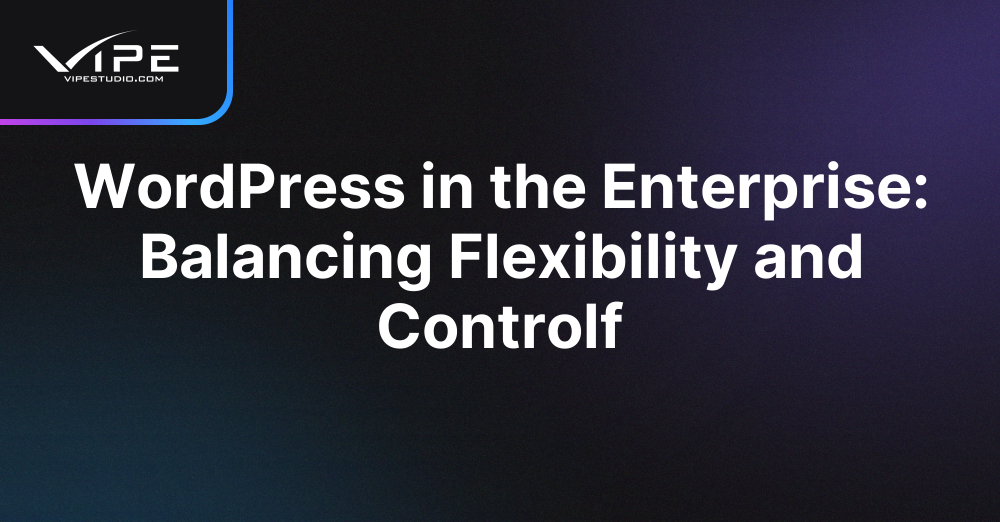13.09.2024
WordPress Development
WordPress in the Enterprise: Balancing Flexibility and Controlf
READING TIME: MIN
Table of Content
In the rapidly evolving digital landscape, WordPress has emerged as a versatile platform for websites of all sizes. While it started as a blogging tool, its adaptability has made it a popular choice for enterprise-level applications. However, leveraging WordPress in an enterprise setting requires a delicate balance between flexibility and control. For businesses seeking custom solutions, partnering with an “Enterprise WordPress agency for custom development” can be crucial for achieving the desired outcomes.
The Appeal of WordPress for Enterprises
WordPress powers a significant portion of the web, and its open-source nature provides a foundation that can be customized to meet complex requirements. Its extensive ecosystem of plugins and themes allows enterprises to tailor their websites to their specific needs. Furthermore, WordPress’s user-friendly interface ensures that non-technical staff can manage content efficiently, a crucial feature for large organizations with diverse teams.
Flexibility Through Customization
One of the main reasons enterprises opt for WordPress is its flexibility. Businesses can use plugins to extend functionality, integrate with third-party services, and adapt the platform to their unique workflows. An “Enterprise WordPress agency for custom development” specializes in creating bespoke solutions that align with an organization’s strategic goals. These agencies can develop custom plugins, themes, and integrations that are tailored specifically to the enterprise’s requirements.
For instance, an enterprise might need a custom CRM integration, advanced analytics, or a proprietary content management system. A specialized agency can ensure these integrations are seamless, optimizing both performance and user experience. This level of customization helps enterprises maintain a competitive edge by enabling unique features and functionalities that are not available in off-the-shelf solutions.
Control and Security Concerns
While flexibility is a significant advantage, it also introduces challenges in terms of control and security. Enterprises require robust security measures to protect sensitive data and comply with regulatory standards. An “Enterprise WordPress agency for custom development” can address these concerns by implementing advanced security protocols and conducting regular audits.
Custom development can also help mitigate risks associated with vulnerabilities in third-party plugins and themes. By developing custom solutions, agencies can ensure that code is secure, reducing the risk of breaches. Additionally, they can provide ongoing support and maintenance to address any emerging security threats, ensuring that the enterprise’s website remains secure and functional.
Performance Optimization
Performance is another critical factor for enterprise WordPress sites. High traffic volumes and complex functionalities can strain server resources, leading to slow load times and diminished user experience. An “Enterprise WordPress agency for custom development” can optimize performance by implementing best practices for coding, caching, and server configuration.
Custom development can also include enhancements such as content delivery networks (CDNs) and advanced caching mechanisms. These improvements can significantly reduce load times and ensure that the website performs efficiently even under high traffic conditions. Performance optimization is essential for maintaining user satisfaction and achieving business goals.
Balancing Flexibility with Governance
For enterprises, balancing flexibility with governance is crucial. While WordPress offers extensive customization options, it’s essential to manage these customizations effectively to avoid potential pitfalls. An “Enterprise WordPress agency for custom development” can help establish governance frameworks that ensure custom developments align with organizational standards and practices.
This involves setting up proper documentation, version control, and change management processes. Agencies can also provide training and support to internal teams, ensuring they understand how to manage and update custom features effectively. By implementing these practices, enterprises can maintain control over their WordPress environment while benefiting from its flexibility.
Choosing the Right Agency
Selecting the right “Enterprise WordPress agency for custom development” is a pivotal decision. Businesses should consider agencies with a proven track record of working with large-scale enterprises and delivering custom solutions. Evaluating their portfolio, client testimonials, and technical expertise can help in making an informed choice.
It’s also important to assess their approach to project management and communication. A collaborative approach, transparent processes, and ongoing support are vital for a successful partnership. The right agency will not only deliver a custom WordPress solution but also provide strategic guidance and support to ensure the enterprise’s long-term success.
Conclusion
WordPress offers unparalleled flexibility and customization options, making it a compelling choice for enterprises. However, achieving the right balance between flexibility and control requires careful consideration and expertise. Partnering with an “Enterprise WordPress agency for custom development” can provide the tailored solutions needed to harness the full potential of WordPress while addressing security, performance, and governance concerns.
By leveraging the expertise of a specialized agency, enterprises can build robust, secure, and high-performing websites that meet their unique requirements and support their business objectives.
More on The Topic
- Navigating WooCommerce Performance: Real-World Strategies
- The Role of AI in WordPress Development Workflows
- Optimizing WordPress for Enterprise: Beyond Basic Caching
- WordPress and Headless Commerce: A Provocative Dilemma
- Decoupled WordPress Architecture: The Future or a Fad?
The content of this website is copyrighted and protected by Creative Commons 4.0.



